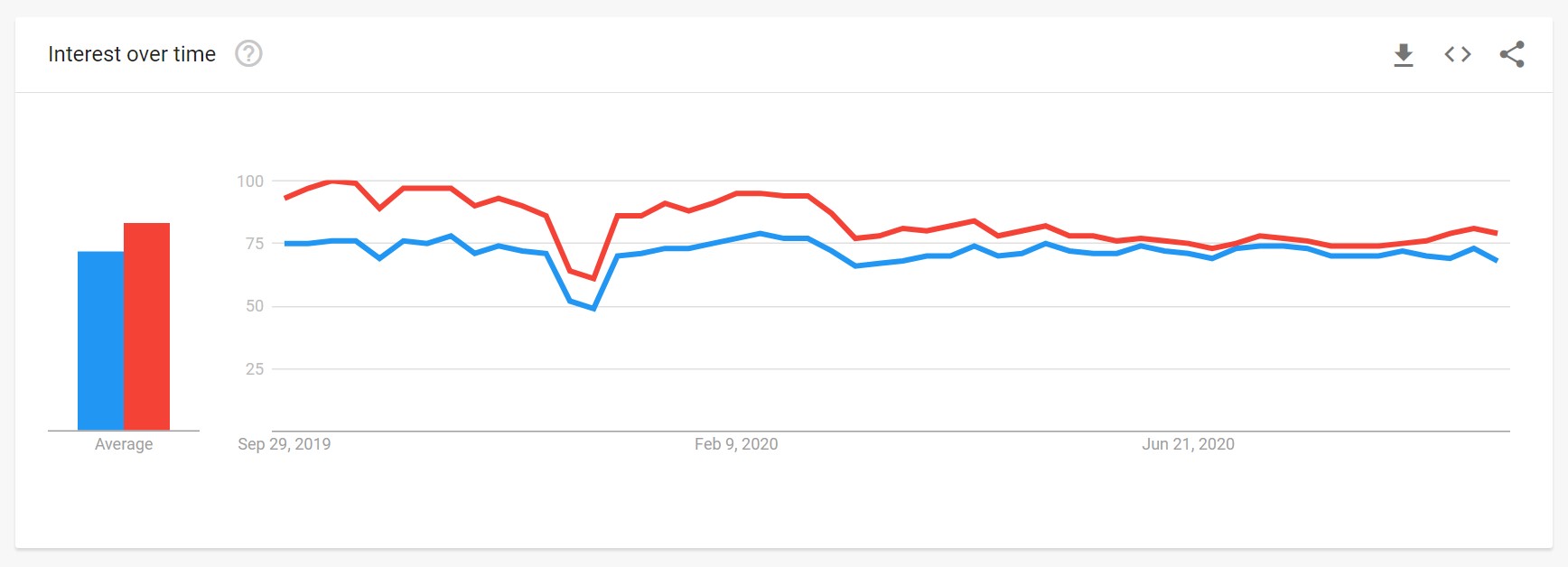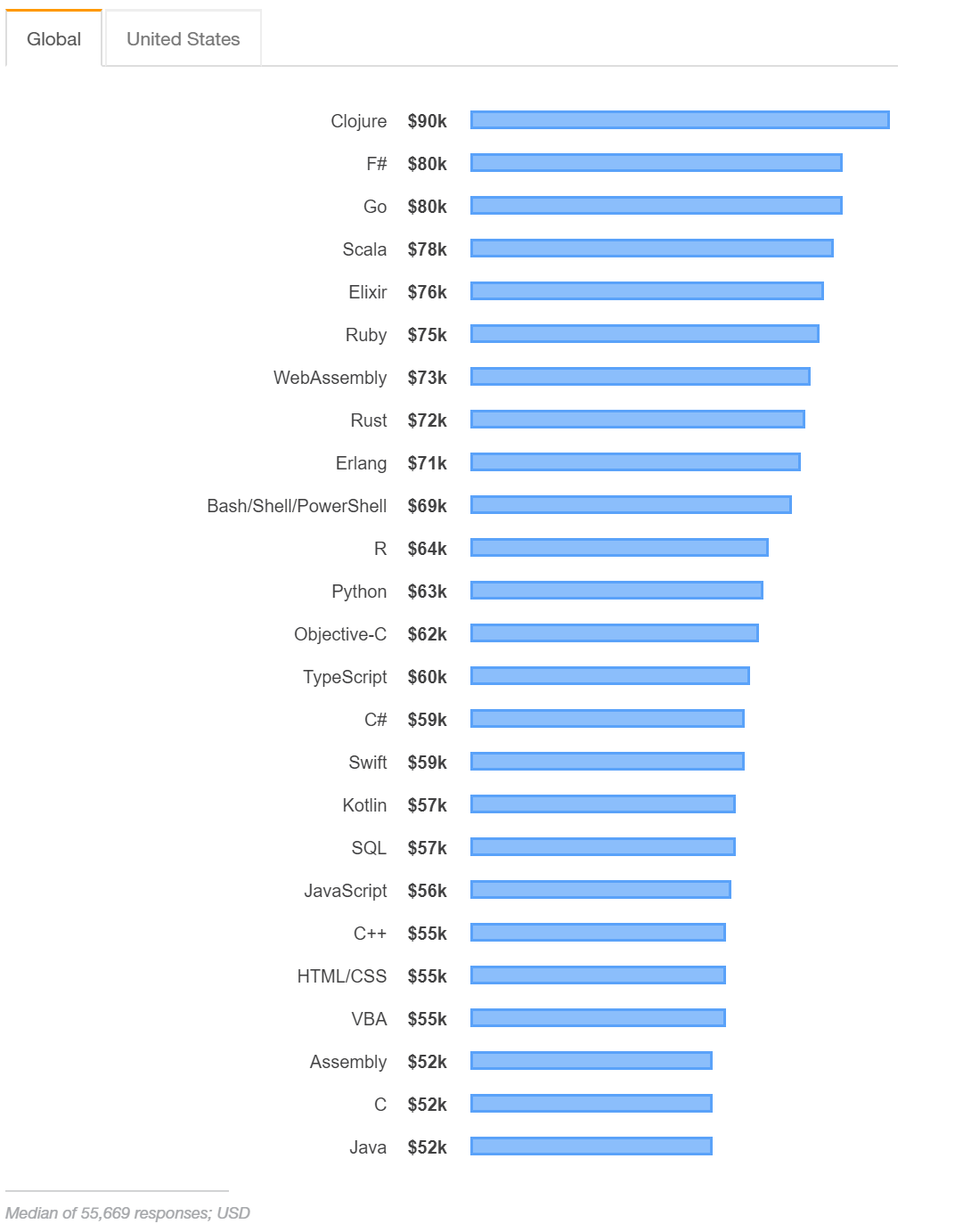Java vs JavaScript - The Ultimate 2020 Comparison
Java and JavaScript are often confused to be the same by new learners.
There are a few similarities and numerous differences between the two. I will be listing everything I can about Java vs JavaScript.
Java vs JavaScript - 2020
Before starting to compare actual differences, let’s start with terminology.
Why is the name JavaScript?
JS was initially created as Mocha by Netscape’s Brendan Eich in 1995. It was inspired by Java and some other languages at the time. When Sun and Netscape became allies, Mocha was seen as a companion language to Java. It was then named JavaScript. It went through 2 name changes.
{{< center >}} Mocha → LiveScript → JavaScript {{< /center >}}
Similarities between Java & JavaScript
There are a few similarities between both languages.
- JavaScript and Java are defined as Object-Oriented Programming (OOP) Languages.
- Both of these languages are not inherently open-source and are licensed.
- They both can create cool apps for
- Android
- Windows
- Linux
- Mac
- JavaScript and Java can write these types of software
- Mobile Apps
- Web Servers
- Frontend (Java using its applets and JavaScript directly embeds).
- Terminal Apps
If there are more similarities, let me know through comments.
Java vs JavaScript: Differences Table
| Difference | Java | JavaScript |
|---|---|---|
| Syntax | Java code must follow strict rules. Variables should be explicitly declared and are checked at the start of compiling. | JavaScript allows relaxed syntax but can be made to follow strict guidelines using "use strict";. |
| Orientation | Java is famously Object-Oriented Programming (OOP) Language | JavaScript is not inherently OOP but can do it relatively well now. It’s basically a scripting Language. |
| Code Execution | Java Code is compiled from source code to bytecode before execution by JVM. | JavaScript is an interpreted language. It can be executed by ECMAScript engines (V8, SpiderMonkey, etc). |
| Classes | You can’t write a program without declaring a class. | You can make programs without a “Class”, but everything in JavaScript is an object. |
| Threads & Concurrency | Java is inherently multi-threaded inherently and uses multiple threads for concurrency. | JavaScript is single-threaded but manages concurrency using an event loop. |
| Standalone | Java code is not embedded into other languages, it stands and executes alone. | JavaScript can be run standalone (eg. node), but on browsers, it’s a part of HTML. |
| Memory Management | Java doesn’t manage memory automatically. It usually uses more memory. | JavaScript smartly manages memory using GC (Garbage Collector), which monitors the allocation. |
| File extensions | Java uses “.java”. | JavaScript uses “.js”. |
Github Repositories
- JavaScript has 380,738 repositories.
- Java has 846,624 repositories.
These figures were taken on 2nd April 2020
Google Trends
It seems Java was and is more popular in search terms than JavaScript. It’s true that Java is used by over a billion devices

The Learning Curve
It’s common to hear in the programming world that JavaScript is easy to learn, while Java is a bit harder. Let’s see how it actually is.
JavaScript is easier to get started with. It’s easy to learn the syntax and a few concepts to start. Some concepts of JavaScript are a bit tricky for first-time learners, like Asynchronous code (promises, callbacks, streams), Classes, Events, Backend (Node). JavaScript’s syntax was inspired by Java.
- Many documentations, tutorials, videos, and free courses are available, plus a strong community.
- ES6+ stuff seems harder to make sense in the beginning but get’s easier over time and is excellent in practice.
- It takes time to get actually great at JavaScript.
- Each JS Library and API requires additional time to master.
Java is a bit intimidating for newbies. It’s usually taught in Colleges and Universities as an introduction to Object-Oriented Programming. It follows strict syntax and generally makes you better at it by error messages. Java doesn’t have a built-in memory allocator, so it’s up to the programmers, which is not so easy.
- Java is rich with documentation, community support, tutorials, courses, and guidelines.
- Concepts like Threads, Reflections, IO, Synchronization, and monitoring are difficult to master.
- Efficient memory utilization is only done properly by good Java programmers.
Salary & Pay Gap
JavaScript and Java don’t have a considerable pay gap, they are both paid almost equally on an hourly basis.

{{< center >}} From StackOverflow 2019 Survey. {{</ center >}}
It mostly depends on where you are hiring from, skill level, and project complexity.
- United States: The average annual pay of JavaScript developer is around $105K while $104K for Java Developers.
- Europe: Average pay is much different depending on the country.
- Asia: Cheapest option available, averaging around $6 - $12 per hour.
*Salaries can vary by huge margins, figures listed above are average.
JavaScript and Java: Use Cases
JavaScript in 2020 has come a long way and is used for the development of a wide range of apps.
- Single Page Applications.
- Via React, Angular, or Vue.
- Advanced HTTP Servers and APIs.
- Via ExpressJS, Restify, or simple HTTP module.
- Mobile Apps for Android and iOS.
- Via React Native.
- Live Apps.
- Via Socket.io or WebSockets.
- Terminal based apps.
- Via Readline, prompt, etc.
- Web Scraping.
- Via Cheerio, Puppeteer, Selenium, etc.
- JavaScript knows the web and can be used for this.
- Windows, Linux, and Mac Apps.
- Via Electron (eg Visual Studio Code).
- Internet of Things development and embedded electronics
- Via Johnny-Five, Cylone and more.
- Make use of popular Databases
- Via Mongoose, MySQL, sequelize, etc.
- Make cool games
- Via Canvas API
- Multiple JS-based gaming engines.
- AI and Machine Learning
- Via TensorFlow, BrainJS, and more.
Java is used for many types of applications, it’s mainly used by enterprises or large projects.
- Android Apps.
- General-purpose hardware programming with more control.
- Software and games for Windows, Mac, Linux, and other platforms.
- Advanced calculations and data reporting.
- Supports all major databases.
- Make amazing games.
Conclusion
I’m a primarily a JavaScript developer, who uses javascript for 90 percent of the projects.
If you’re getting started with programming, I’d recommend JavaScript.
What are your thoughts regarding Java vs JavaScript? What do you prefer? Did I miss something?